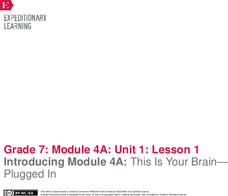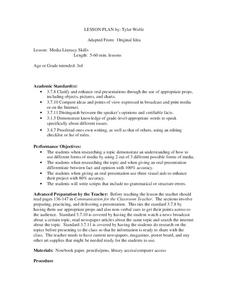Curated OER
Teaching Summarization
Examine the process of summarizing a piece of text using the book So You Want to Be a President? Kids review the definitions for main idea, topic sentences, superordinate terms, and supporting details. Next, they work in small groups to...
EngageNY
Building Background Knowledge: Jigsaw to Build and Share Expertise about the 2010 Haiti Earthquake, Part 2
Calling all experts! Using the educational resource, pupils work together in small expert groups, reading an article about the 2010 Haiti earthquake. As they read, they record two main ideas and supporting details from the text.
EngageNY
Reading for Gist: “Middle Ages” Excerpt 2
Read and repeat. Scholars repeat the strategies for digging deeper into text from instructional activity two. This time they focus on Middle Ages Excerpt 2. Learners write unfamiliar words in the word catcher and use details from the...
Curated OER
Short and Sweet Science
Readers learn how to summarize scientific text and evaluate the advantages, disadvantages, and challenges in writing summaries. They select science-related articles you've pulled and collected from the New York Times and, with a partner,...
Curated OER
Outline It!
Fourth graders investigate how outlining can aid in comprehending text. In this reading comprehension lesson plan, 4th graders outline an article they read in groups of two. Students take turns reading the article, identifying the main...
Curated OER
Finding the Main Idea and Supporting Details
Twelfth graders examine how to identify the main idea and supporting details in a reading passage. They read an article, answer who, what, when, where, and how, discuss the answers, and identify the main idea and supporting details.
Curated OER
What's the Main Idea??
Young scholars determine how to form a simple topic sentence in order to summarize a reading passage to increase comprehension. They apply the strategy to reading a passage from a textbook by writing a topic sentence for paragraphs about...
Curated OER
Hands-On Outlining
In order to write an effective outline, children must be able to identify main ideas and supporting details, which is the aim of this fun and kinesthetic activity. The class works on the floor to organize sentence strips prepared by the...
Curated OER
Paraphrasing-Timbuktu in Your Own Words
How do you paraphrase information? Part of plagiarizing is taking information word for word and using it in your writing. Teach your writers how to paragraphs correctly to avoid this! They watch a QuickTime video on Timbuktu and...
EngageNY
Introducing Module 4A: This Is Your Brain—Plugged In
What does brain science reveal about teens and decision making? Scholars watch a short video and participate in a gallery walk to pique their interest and curiosity about the topic. Next, they begin reading an informational article about...
EngageNY
Analyzing the Features of a Newspaper Article
There's more to newspaper articles than meets the eye. Scholars learn the different features of a newspaper article, including headline, byline, subheadings, etc. Pupils circle the features in an article as the teacher discusses their...
Curated OER
Summarization Superstars
How do you read when you know you're going to be summarizing a text? Summarize a nonfiction text with your upper elementary schoolers. Your pupils independently read a nonfiction article and write a summary paragraph using the six-step...
Curated OER
Mapping Out the Story
Discuss the reading comprehension strategy of summarization with your elementary schoolers! They read a chapter from their social studies textbook, Regions Near and Far, and create a map, or word web, for the chapter. They identify...
Curated OER
Anticipation Guides Improve Reading Comprehension
Beginning with anticipation guide strategies is a powerful method for improving reading comprehension. First, list initial ideas for a topic the class will be reading about. These ideas are formulated into statements, some of which are...
Curated OER
Why Do Authors Write?
Sixth graders use short reading passages to identify, explain, and discuss the author's purpose for writing. After a lecture/demo, they utilize a graphic organizer embedded in this plan to organize their writing ideas.
Curated OER
Media Literacy Skills
You're on camera! Third graders find a news story and research it to get more information. Everyone uses their found information to write a script and create their own news broadcast!
EngageNY
Close Reading of Excerpts from My Librarian Is a Camel: How Do People Access Books Around the World?
Acquaint your class with informational text through a close reading. First, examine a couple of pages together, looking at text features and content. The whole class focuses on marking down a brief summary of each paragraph before...
EngageNY
Close Reading: The Introduction to the Universal Declaration of Human Rights
As part of a group of lessons, your class will return to the primary text for this unit, the Universal Declaration of Human Rights. Key vocabulary as well as close reading strategies continue to be the focus skills; however, this...
EngageNY
Grade 9 ELA Module 2, Unit 3, Lesson 12
As the first in a two-part, end-of-unit assessment that encourages readers to synthesize the unit's main ideas, class members review their notes for each of the three texts they read and develop three open-ended discussion questions...
Curated OER
Research Skills: Information Retrieval and Evaluation
Focus on research skills, specifically identifying key words and concepts on a specific topic and evaluating information for relevance and authority. This is part of a multi-step instructional activity on Ancient Rome; however, it is...
Curated OER
Headings and Titles
Fifth graders explain the difference between the title of a text and the headings. In this language arts lesson, 5th graders discuss how the heading is related to the main idea of a text. Additionally, students write information related...
Curated OER
Paraphrasing and Summarizing
Read an article about the migration of our ancestors and write a paragraph. Pupils paraphrase and summarize to restate the information found in a nonfiction text. They write a shortened version of the reading to demonstrate the...
Curated OER
Who Was That Man?
Develop historical analysis and interpretation with your older learners. They will study and analyze three given interpretations of Christopher Columbus' life, which includes significant events, his character, and the impact he made on...
Curated OER
Research Skills: Evaluating Information and Sources
While this focuses on Ancient Rome, the objectives are improved research and information evaluation skills. In one class period, class members narrow their topic, research it, select the best information, log useful sources, and discuss...

























